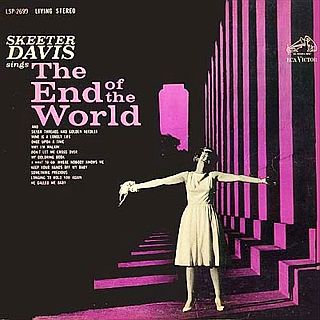
Cover of 1963 Skeeter Davis album, “The End of The World,” also the title of her hit single that year. RCA label. Click for CD.
During March 1963, this song — performed by country singer Skeeter Davis — hit No. 2 on both the Billboard country and pop charts. The Davis song also hit No. 4 on the Billboard R&B chart and went to No. 1 for four weeks on the Billboard adult contemporary chart. “The End of the World” — about a lost love or personal bereavement — also rose into the Top 20 on the U.K. music charts.
Davis, then in her early 30s, was a country recording artist, and had started out singing as a teenager in the late 1940s as part of The Davis Sisters duo. She later began recording as a solo artist for RCA Records. By the late 1950s, she had become mostly a country star with some crossover to pop music.
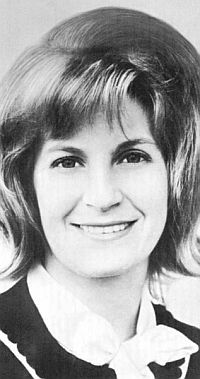
Skeeter Davis in a promo ad for her song, "What Am I Gonna Do Without You", October 1964.
Music Player
“The End of The World”
Skeeter Davis-1963
In later years, “The End of the World” came to be regarded as something of a modern standard, subsequently covered by acts as diverse as Loretta Lynn, the Carpenters, Nancy Sinatra, Johnny Mathis, and John Cougar Mellencamp.
The Skeeter Davis version, however, the original “End of The World,” has been featured in a number of films, including: Girl, Interrupted, Riding In Cars With Boys, Daltry Calhoun, An American Affair, and others.
TV shows, including Mad Men, Under The Dome, and Granite Flats have also used the song. John Cassidy, writing in The New Yorker, noted that Mad Men in particular “took great pains to design its closing-credit songs,” adding that “the episode dealing with the assassination of John F. Kennedy ended with Skeeter Davis’s mysterious and mournful ‘The End of the World’.” The song has also been used in video games, such as Fallout 4 and Tom Clancy’s EndWar. “The End of the World” was also played at Chet Atkins’s funeral in an instrumental version by Marty Stuart, and at Davis’s own funeral in 2004 at the Ryman Auditorium.
|
“The End of The World” Why does the sun go on shining? Why do the birds go on singing? I wake up in the morning and I wonder, Why does my heart go on beating? Why does my heart go on beating? |
Skeeter Davis – Mary Frances Penick – was born in a two-room cabin at Dry Ridge, Kentucky near Glencoe in 1931. She was the first of seven children, and she grew up on a farm. Her grandfather, impressed by her energy, nicknamed her “Skeeter.” After 1947, the Penick family moved to Covington, Kentucky, and it was there that Skeeter began singing with high school classmate Betty Jack Davis. Adapting the name the Davis Sisters – when Skeeter Penick became Skeeter Davis – the two girls gained momentum in the early ’50s working at Detroit’s WJR radio station on the “Barnyard Frolics” show. The girls’ harmonies came to the attention of RCA’s Steve Sholes, who signed them to a recording contract in 1953. They were just a year or two out of high school by then. That summer, as their “I Forgot More Than You’ll Ever Know” headed to No. 1 and million-seller status, a violent car crash left Betty Jack dead and Skeeter injured. Betty’s stage mother, reportedly then coerced Skeeter into performing with Betty’s sister, Georgia, through 1956. Skeeter then married, in part to escape Mrs. Davis, and begin a solo career.
Chet Atkins had played guitar on nearly all the Davis Sisters’ RCA sessions. By 1958 Atkins ran the RCA Nashville recording shop. Suspecting Skeeter’s voice had broader potential, he multi-tracked her vocals to echo the Davis Sisters sound. Skeeter also joined the Grand Ole Opry as a solo act in 1959. Between 1959 and 1962, she had a series of Top 10 and Top 20 hits on the Billboard Country chart including: “Am I That Easy To Forget” (1960); “(I Can’t Help You) I’m Falling Too” (1960), “My Last Date (With You)” (1961), and “Where I Ought to Be” (1962). Some of these latter recordings were “answer songs” to popular country recordings of the time.
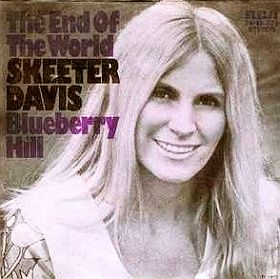
Skeeter Davis on later copy of her single, “The End of the World” with “Blueberry Hill” on the B-side.
Radio DJs, however, had initially been playing the B-side of the record, which was the old pop standard, “Somebody Loves You.” But New York City disc jockey Scott Muni of WABC flipped it over and began playing Davis’s sentimental ballad. In the next week, it sold 100,000 copies.
And with that, Skeeter Davis was on her way to becoming a big crossover star, as the “The End of The World” climbed the Billboard pop chart.
The song reached it’s peak in March 1963, rising to No. 2 on the Billboard Hot 100 and No.2 on the Billboard country chart.
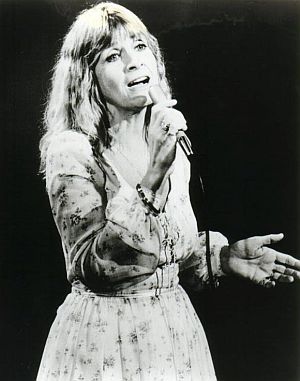
Skeeter Davis performing, likely in the 1970s.
But Davis expressed frustration when some of her country music fans accused her of selling out when the song became a big hit on the pop charts. For Davis, that only meant a broader audience, and the likely prospect that those listeners would spend more time with country music. “I know they began listening to my other albums and those of a lot of other country artists,” she would say in later interviews. “I looked upon these events as just another way of getting country music heard.”
In 1963, Davis achieved another country pop hit with the Carole King-penned song “I Can’t Stay Mad At You,” which became a Top 10 pop hit, peaking at No. 7.
During her career, Davis received five Grammy Award nominations, including four for Best Female Country Vocal Performance — in 1964 for “He Says the Same Things to Me;” 1965 for “Sunglasses;” 1967 for “What Does It Take;” and 1972 for “One Tin Soldier.”
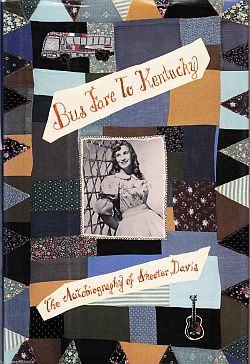
Cover of Skeeter Davis’s 1993 book, “Bus Fare to Kentucky,” using country quilt motif. Click for book.
In 1973 during a performance at the Grand Ole Opry, Skeeter dedicated a gospel song to street evangelists that had been arrested by Nashville police. For her “political” commentary, Davis was barred from the Grand Ole Opry for a time, but was later reinstated. In the 1970s, Davis was active singing with religious ministries and spent some time evangelizing in Africa.
In the mid-1970s she returned to the recording studio briefly with Mercury Records in 1976, producing two single releases, including her last song to chart nationally, “I Love Us.”
In 1985, New York Times pop music critic, Robert Palmer, noting an upcoming appearance by Skeeter Davis in December with the band NRBQ at New York’s Lone Star Café, called her “an extraordinary country-pop singer,” albeit one, he noted, who had faded from popularity and was then seldom seen. Palmer added, however, that on the basis of her NRBQ songs and recording history, “Miss Davis is still an exceptional singer” and her appearance in New York was “eagerly awaited.” Davis and NRQB that year had released the album She Sings, They Play.

Back cover of “Bus Fare to Kentucky” shows Skeeter Davis performing.
In her career as a solo artist, Skeeter Davis placed a total of 43 singles on the Billboard Country Chart between 1957 and 1976. She also recorded some 30 studio albums and 14 compilation albums. Davis was an acknowledged influence on Tammy Wynette and Dolly Parton. Throughout much of the 1990s and into the early 2000s, Davis continued to perform. Her autobiography, Bus Fare to Kentucky – named after a 1971 Davis hit – was published in 1993 with a hardback print run of 40,000 copies and $40,000 for promotion. In 1998 she wrote a children’s book, The Christmas Note, with Cathie Pelletier. In 2001 she became incapacitated by the breast cancer that would later claim her life. While Davis remained a member of the Grand Ole Opry until her death, she last appeared on the program there in 2002. She was 72 when she died from breast cancer on September 19, 2004.
Other stories about country artists at this website include, “Last Date” (Floyd Cramer); “Paradise” (John Prine); and “Sixteen Tons” (Tennessee Ernie Ford). Thanks for visiting – and if you like what you find here, please make a donation to help support the research and writing at this website. Thank you. – Jack Doyle
|
Please Support Thank You |
____________________________________
Date Posted: 28 May 2014
Last Update: 21 April 2019
Comments to: jdoyle@pophistorydig.com
Article Citation:
Jack Doyle, “The End of the World, Skeeter Davis:1963″
PopHistoryDig.com, May 28, 2014.
____________________________________
Sources, Links & Additional Information
|
“WABC-Top Hits” 1. Go Away Little Girl – Steve Lawrence |
“Skeeter Davis,” Artist Profile, Country Politan.com.
“Skeeter Davis,” Wikipedia.org.
“The Incomparable Skeeter Davis,” Country Music Life, January 1966.
Rich Kienzle, “Skeeter Davis, 1931-2004,” No Depression Magazine, November-December 2004.
Skeeter Davis Discography,” Wikipedia .org.
“Skeeter Davis: ‘I’m So Straight, It’s Ridiculous’,” Look, July 13, 1971.
Gail Buchalter, “Skeeter’s Scoot To Stardom,” Country Song Roundup, August 1971.
Patrick Thomas, “Grand Ole Opry Suspends a Star,” Rolling Stone, January 31, 1974.
Robert Palmer, “Critics’ Choices; Pop Music, New York Times, December 15, 1985.
Jeff Tamarkin, “Skeeter Davis: They Don’t Make ‘Em Any Sweeter,” Goldmine, January 31, 1986.
Skeeter Davis, Bus Fare to Kentucky: The Autobiography of Skeeter Davis, Birch Lane Press, September 1993, 338 pp.
Bob Allen, “The Davis Sisters: The Lasting Legacy of a Short-Lived Duo,” The Journal of the American Academy for the Preservation of Old-Time Country Music, December 1993.
“Song Sung Blue: ‘Breaking Bad’ and Pop Music,” NewYorker.com, October 2, 2013.
_______________________________